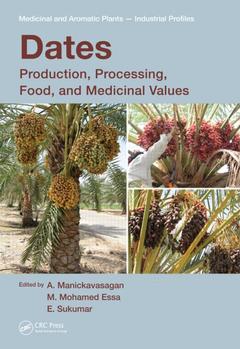Dates Production, Processing, Food, and Medicinal Values Medicinal and Aromatic Plants - Industrial Profiles Series
Coordonnateurs : Manickavasagan A., Essa M. Mohamed, Sukumar E.

Of the many varieties of date palms, the species Phoenixdactylifera Linn. is cultivated extensively and traded and consumed worldwide. Dates:Production, Processing, Food, and Medicinal Values draws from a broad spectrum of contributors to present a comprehensive survey of this particular species. The book explores a range of essential facets of what many consider to be a wonder plant?from its cultivation to its potential for medicinal purposes.
Divided into four parts, the book begins by examining cultural practices and their implications for date quality. The contributors discuss tissue culture studies, farm water management, mechanization approaches in pollination and harvesting operations, and marketing aspects. The second section focuses on postharvest operations such as drying and explores alternatives for methyl bromide fumigation and value-added products. It also reviews biofuel production from by-products and discusses the issue of waste generated from industry.
The third part of the book highlights the physical, chemical, and structural characteristics of dates. It reviews fermentative products that use dates as substrate, discusses the fruits as a substitute for added sugar in food, and explores date palm feeding to livestock. The final section discusses the possibilities for nutritional and medicinal use and reviews the use of dates in indigenous medicine.
Exploring essential properties and agricultural implications, this volume is a reliable resource for understanding the many aspects of the Phoenix dactylifera Linn.
Production. An Overview of Date Palm Production. Tissue Culture Studies in Date Palm. The Date Palm Genome Project at Kingdom of Saudi Arabia. Water Management in Date Palm Groves. Fertilizer Application in Date Palm Cultivation. Environmental Concern in Date Palm Production from Atmospheric Trace Metal Contamination. Salinity Problems and Their Management in Date Palm Production. Insects in Date Palm Field and Their Management. Mechanization in Date Palm Pollination. Design Concepts for Date-Harvesting Process. Dates Marketing. Processing. Drying Characteristics, Rehydration, and Color Changes of Palm Fruits During Storage. Solar Tunnel Dryer: A Novel Dryer for Dates. Processing of Dates by Dehydration and Microwave Drying. Quality Assessment of Dates by Computer Vision Technology. Nonchemical Methyl Bromide Alternatives in Dates’ Processing Sector. Processing of Dates into Value-Added Products. Exploring the Possibility of Biofuel Production from By-Products and Wastes Generated from Date Industry. Food. Physical Characteristics and Chemical Composition of Date Palm Fruits. Sorption and Structural Characteristics of Date Palm Fruit. Fermentative Products Using Dates as a Substrate. Dates: Potential Substitute for Added Sugar in Food. Use of Date Palm By-Products in Feeding Livestock. Medicinal Values. Dates: A Fruit from Heaven. The Functional Values of Dates. Nutritional and Medicinal Value of Date Fruit. Uses of Date Palm in Ayurveda. Dates in Indigenous Medicines of India. Antiamyloidogenic Effect of Dates Grown in Oman with Reference to Their Possible Protection against Alzheimer’s Disease. Index.
Dr. Manickavasagan obtained a PhD in Biosystems Engineering from the University of Manitoba, Canada. He is a licensed Professional Engineer (PEng) in the province of New Brunswick, Canada. After attaining his PhD, he worked with McCain Foods Limited (Canada) as a Scientist. Presently, he is an Assistant Professor at Sultan Qaboos University, Oman. He has published more than 50 scientific papers in peer-reviewed journals and international conferences.
Dr. M. Mohamed Essa obtained a PhD in Biochemistry from Annamalai University, India and did Post doctoral research in Neurosciences in NYSIBR, New York, USA. He is currently an Assistant Professor at Sultan Qaboos University, Oman and Visiting Assistant Professor in Neuropharmacology group, University of New South Wales, Sydney, Australia. He conducts research in pharmacological approaches of natural products against neurological diseases by using various available models. He has published nearly 55 research articles in various peer-reviewed international journals and conferences and is the Editor-in-Chief of the International Journal of Nutrition, Pharmacology, Neurological Diseases published by Wolters-Kluwer, USA.
Dr. Ethirajan Sukumar obtained PhD in Phytochemistry and Phytobiology from the University of Madras,India and did Postdoctoral work at the University of Virginia in the USA. He is an Assistant Professor at the Higher College of Technology, Muscat, Oman. Prior to full time teaching, he was a Research Scientist in the Central Research Institute of Siddha Medicine in Chennai, India for more than 26 years. During his research career, he worked on medicinal plants used in indigenous medical practices and published 52 research papers in peer-reviewed journals.
Date de parution : 04-2012
Ouvrage de 442 p.
17.8x25.4 cm
Thèmes de Dates :
Mots-clés :
Ra Te; Date Palm Cultivar; Phoenix dactylifera Linn; Date Palm; dates; Moisture Content; Date Palm Orchards; Date Palm Fruit; Date Flesh; Date Syrup; Moisture Sorption Isotherm; Deglet Nour; Date Juice; Date Pits; Date Fruits; Dried Dates; Red Palm Weevil; Solar Tunnel Dryer; Somatic Embryos; Lactic Acid; MB Alternative; Somatic Embryogenesis; Microwave Drying; Added Sugar Intake; Ipm Program; Citric Acid; Shoot Tip Explants



